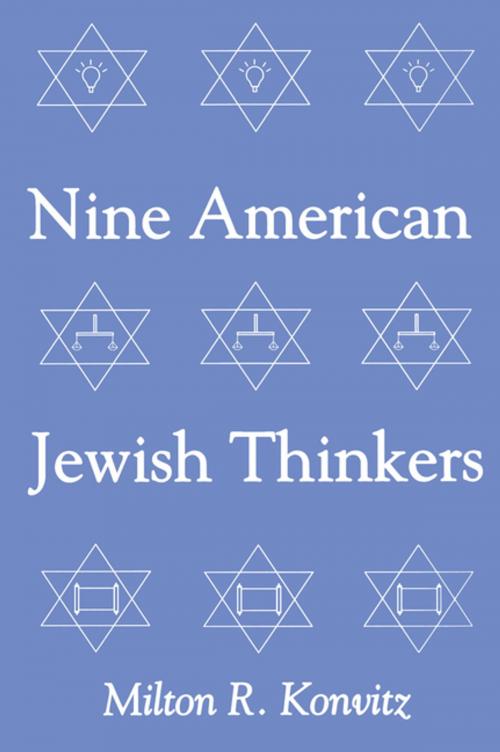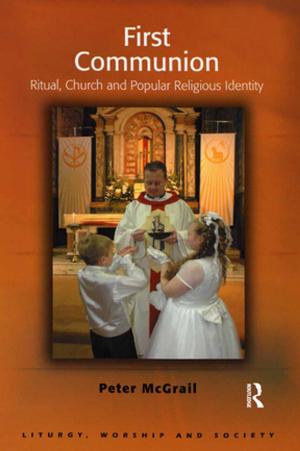| Author: | Milton Konvitz | ISBN: | 9781351326667 |
| Publisher: | Taylor and Francis | Publication: | April 17, 2018 |
| Imprint: | Routledge | Language: | English |
| Author: | Milton Konvitz |
| ISBN: | 9781351326667 |
| Publisher: | Taylor and Francis |
| Publication: | April 17, 2018 |
| Imprint: | Routledge |
| Language: | English |
The nine American Jews of whom Milton Konvitz writes are philosophers, jurists, or rabbis, widely known and readily accepted as American Jewish thinkers. Their work reflects all essential Jewish values. Each person in his own way has dedicated his work to the betterment of life and the advancement of human ideals. In this sense, their Jewishness is not defined by religion alone. Americanism permeated all they thought and all they did.Konvitz argues that in the complex modern world, secularists often serve God more handsomely than do members of synagogues or churches. For example, when the Supreme Court in 1954 (with Felix Frankfurter playing a key role behind the scenes) agreed to outlaw segregation of the races in public schools, was the Court's action secular or religious? When Congress passed the statute known as the Americans with Disabilities Act, requiring equal treatment of handicapped persons, was the action secular or religious? Is a minimum wage act secular or religious? Is Medicaid a secular or a religious act? Konvitz believes the distinction is not useful, or even possible.The book is divided into three parts, reflecting Konvitz's range of intellectual interests. The nine essays offer concise intellectual biographies of three American Jewish philosophers, three Supreme Court Justices, and three rabbis. The philosophers-Horace M. Kallen, Morris Raphael Cohen, and Sidney Hook-are world-renowned. The jurists-Louis D. Brandeis, Benjamin N. Cardozo, and Felix Frankfurter-hold prominent places in American legal history. And the three rabbis-Leo Jung, Robert Gordis, and Jacob Agus-are known wherever Jewish thought is studied. By treating with equal seriousness the lives and writings of both religious and secularist thinkers, the author intentionally minimizes the conventional antagonism and frequent conflict between religion and secularism.An unusual feature of the book is the fact that the author was a close friend of six of the persons whose lives and work are examined, allowing him a perceptive insight into their character and thought. Although the book is about serious subjects, its graceful style makes the contents easily accessible to lay persons as well as scholars and students of Judaica.
The nine American Jews of whom Milton Konvitz writes are philosophers, jurists, or rabbis, widely known and readily accepted as American Jewish thinkers. Their work reflects all essential Jewish values. Each person in his own way has dedicated his work to the betterment of life and the advancement of human ideals. In this sense, their Jewishness is not defined by religion alone. Americanism permeated all they thought and all they did.Konvitz argues that in the complex modern world, secularists often serve God more handsomely than do members of synagogues or churches. For example, when the Supreme Court in 1954 (with Felix Frankfurter playing a key role behind the scenes) agreed to outlaw segregation of the races in public schools, was the Court's action secular or religious? When Congress passed the statute known as the Americans with Disabilities Act, requiring equal treatment of handicapped persons, was the action secular or religious? Is a minimum wage act secular or religious? Is Medicaid a secular or a religious act? Konvitz believes the distinction is not useful, or even possible.The book is divided into three parts, reflecting Konvitz's range of intellectual interests. The nine essays offer concise intellectual biographies of three American Jewish philosophers, three Supreme Court Justices, and three rabbis. The philosophers-Horace M. Kallen, Morris Raphael Cohen, and Sidney Hook-are world-renowned. The jurists-Louis D. Brandeis, Benjamin N. Cardozo, and Felix Frankfurter-hold prominent places in American legal history. And the three rabbis-Leo Jung, Robert Gordis, and Jacob Agus-are known wherever Jewish thought is studied. By treating with equal seriousness the lives and writings of both religious and secularist thinkers, the author intentionally minimizes the conventional antagonism and frequent conflict between religion and secularism.An unusual feature of the book is the fact that the author was a close friend of six of the persons whose lives and work are examined, allowing him a perceptive insight into their character and thought. Although the book is about serious subjects, its graceful style makes the contents easily accessible to lay persons as well as scholars and students of Judaica.















